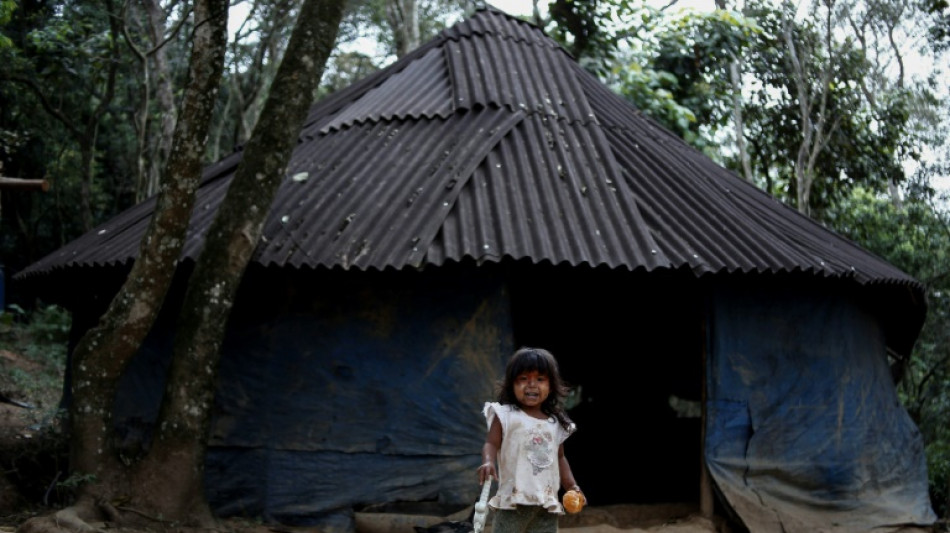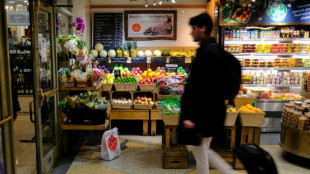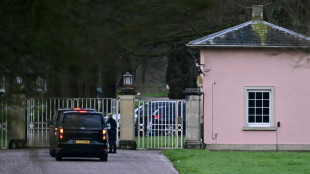
-
 US freestyle skier Ferreira wins Olympic halfpipe gold
US freestyle skier Ferreira wins Olympic halfpipe gold
-
Svitolina edges Gauff to set up Pegula final in Dubai

-
 'Proud' Alcaraz digs deep to topple Rublev and reach Qatar final
'Proud' Alcaraz digs deep to topple Rublev and reach Qatar final
-
UK govt considers removing ex-prince Andrew from line of succession

-
 New study probes why chronic pain lasts longer in women
New study probes why chronic pain lasts longer in women
-
Trump vows 10% global tariff after stinging court rebuke

-
 Aston Martin in disarray as Leclerc tops F1 testing timesheets
Aston Martin in disarray as Leclerc tops F1 testing timesheets
-
Venus Williams accepts Indian Wells wild card

-
 Anxious Venezuelans seek clarity on new amnesty law
Anxious Venezuelans seek clarity on new amnesty law
-
Last-gasp Canada edge Finland to reach Olympic men's ice hockey final

-
 Scotland captain Tuipulotu grateful for Wales boss Tandy's influence
Scotland captain Tuipulotu grateful for Wales boss Tandy's influence
-
Zelensky says no 'family day' in rare personal interview to AFP

-
 Zelensky tells AFP that Ukraine is not losing the war
Zelensky tells AFP that Ukraine is not losing the war
-
Sweden to play Switzerland in Olympic women's curling final

-
 Counting the cost: Minnesota reels after anti-migrant 'occupation'
Counting the cost: Minnesota reels after anti-migrant 'occupation'
-
UK police probe Andrew's protection as royals reel from ex-prince's arrest

-
 Doris says Ireland must pile pressure on England rising star Pollock
Doris says Ireland must pile pressure on England rising star Pollock
-
US military assets in the Middle East

-
 Neymar hints at possible retirement after World Cup
Neymar hints at possible retirement after World Cup
-
Stocks rise after court ruling against US tariffs

-
 Australia end dismal T20 World Cup by thrashing Oman
Australia end dismal T20 World Cup by thrashing Oman
-
Olympics chief says Milan-Cortina has set new path for Games

-
 Russian SVR spy agency took over Wagner 'influence' ops in Africa: report
Russian SVR spy agency took over Wagner 'influence' ops in Africa: report
-
Pegula fights back to sink Anisimova and reach Dubai final

-
 Trump administration denounces 'terrorism' in France after activist's killing
Trump administration denounces 'terrorism' in France after activist's killing
-
Colombia's Medellin builds mega-prison inspired by El Salvador's CECOT

-
 German broadcaster recalls correspondent over AI-generated images
German broadcaster recalls correspondent over AI-generated images
-
US Supreme Court strikes down swath of Trump global tariffs

-
 England's Itoje says managing 'emotional turmoil' key to 100 cap landmark
England's Itoje says managing 'emotional turmoil' key to 100 cap landmark
-
Trump says weighing strike on Iran as Tehran says draft deal coming soon

-
 Tudor is '100 percent' certain of saving Spurs from relegation
Tudor is '100 percent' certain of saving Spurs from relegation
-
Azam dropped for scoring too slowly, says Pakistan coach Hesson

-
 Stocks volatile after soft US growth data, court ruling against tariffs
Stocks volatile after soft US growth data, court ruling against tariffs
-
Italy bring back Capuozzo for France Six Nations trip

-
 From Malinin's collapse to Liu's triumph: Top Olympic figure skating moments
From Malinin's collapse to Liu's triumph: Top Olympic figure skating moments
-
Arteta urges Arsenal to 'write own destiny' after title wobble

-
 Ukraine Paralympics team to boycott opening ceremony over Russian flag decision
Ukraine Paralympics team to boycott opening ceremony over Russian flag decision
-
Wales captain Lake wants fans to bring 'noise' against Scotland

-
 Skier Vonn's Italian hospital a hotbed of men, sister says
Skier Vonn's Italian hospital a hotbed of men, sister says
-
India target S.Africa top order, Abhishek to come good: bowling coach

-
 Carrick praises Man Utd 'diversity' after Ratcliffe's immigrant rant
Carrick praises Man Utd 'diversity' after Ratcliffe's immigrant rant
-
I never thought it would be hit, says 'Scream' creator 30 years later

-
 AI summit statement delayed to 'maximise' signatories: India
AI summit statement delayed to 'maximise' signatories: India
-
Barcelona's Sagrada Familia basilica hits peak height

-
 Milan sprints to second straight UAE stage win as Tiberi keeps lead
Milan sprints to second straight UAE stage win as Tiberi keeps lead
-
US GDP growth misses expectations as Trump blames shutdown

-
 Benfica investigate video of fans' monkey gestures
Benfica investigate video of fans' monkey gestures
-
French minister pledges tight security at rally for killed activist

-
 Guardiola 'couldn't care less' about Arsenal stumble in title race
Guardiola 'couldn't care less' about Arsenal stumble in title race
-
UK police search property as royals reel from Andrew's arrest


Indigenous land rights help protect Brazil's forests
Territories in Brazil's fragmented Atlantic Forest where Indigenous peoples enjoy secure land rights have seen measurably less deforestation than similar areas in which land tenure is weak or non-existent, researchers reported Thursday.
The findings, published in the journal PNAS Nexus, are the first to quantify the benefits of enhanced Indigenous land rights for Brazil's tropical rainforests, and add to a growing body of peer-reviewed literature highlighting more broadly the advantages of Indigenous stewardship.
"Even in highly developed and heavily deforested areas, granting land tenure to Indigenous peoples significantly improved forest outcomes," including less tree loss and more reforestation, lead author Rayna Benzeev, a researcher at the University of Colorado Boulder, told AFP.
"Each year after tenure was formalised, there was, on average, a 0.77 percent increase in forest cover compared to untenured lands," she added.
"That can add up over decades."
The Atlantic Forest -- Brazil's second-largest rainforest after the Amazon, stretching along 3,000 kilometres (1,860 miles) of coastline -- has been decimated by centuries of urbanisation, agriculture, logging and mining. It is home to 70 percent of the country's population, including Sao Paulo and Rio de Janeiro.
Only 12 percent of original forest area remains intact, versus about 80 percent for the Amazon.
Benzeev and colleagues looked at data on changes in forest cover and land tenure in 129 Atlantic Forest indigenous territories between 1985 and 2019.
They compared tree loss and reforestation within territories before and after land rights were granted, as well as across territories with different degrees of land tenure.
"Indigenous lands with tenure showed a reduction in deforestation and increase in reforestation compared to lands that didn't have secure legal rights," said Benzeev, writing from Brazil's Atlantic Forest, where she is sharing her findings with Indigenous leaders.
Jera Poty Mirim, a Guarani leader in the Tenonde Pora Indigenous Territory, said the study confirmed what Indigenous people already knew.
"Even before we reached the final step in obtaining recognition of strong rights to our lands, our people began to take care of our forests and to plant the traditional food crops of the Guarani," she told journalists this week.
- An ongoing challenge -
"But wherever communities have secure rights we can protect our forests better and invite partners to support our work to reforest the land destroyed by others."
On paper, Brazil provides robust legal protections for Indigenous rights. But in reality lax enforcement coupled with corruption has fuelled deforestation and illegal expropriation.
In the Atlantic Forest, encroachment by land grabbers, squatters and extractive industries -- whether mining or logging -- "remains an ongoing challenge for land defenders", the report's authors noted.
Those pressures surged during the administration of far-right President Jair Bolsonaro, who stepped down on January 1.
Incoming President Luiz Inacio Lula da Silva has vowed to reverse those trends, and has set 2030 as a target for reaching zero deforestation.
"Titling the lands of Indigenous people is crucial if we want to guarantee the end of deforestation and preserve the global climate in balance," Paulo Moutinho, a senior scientist at Brazil's Amazon Environmental Research Institute (IPAM) and fellow at the Woodwell Climate Research Center, told AFP, commenting on the study.
The stakes for protecting the Amazon basin, the world's largest tropical biome, are both local and global.
Climate change coupled with forest destruction are pushing the Amazon basin toward a "tipping point" where it will shift from a tropical forest to a savannah-like state.
From 2000 to 2020, Brazil experienced a net loss of more than 20 million hectares of forest, or about six percent of total tree cover, according to Global Forest Watch.
L.Harper--AMWN



